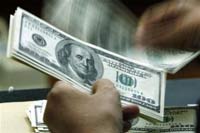Recession is in store for US economy
The worst economic growth in four years is raising concern that troubles in the U.S. housing market will spread and throw the country into a recession before the year is out.

The economy practically crawled at a 1.3 percent pace in the opening quarter of 2007, the Commerce Department reported Friday. That was even weaker than the sluggish 2.5 percent rate in the closing quarter of last year.
The main culprit in the slowdown: the housing slump, which made some businesses act cautiously. The bloated trade deficit also played a role.
Consumers largely carried the economy in the first quarter. But will they stay resilient in light of the troubled housing market, fallout from risky mortgages and rising energy prices?
"The No. 1 question is can the consumer continue to play Atlas while the housing market crumbles around him?" said Richard Yamarone, economist at Argus Research. Others worry about businesses' appetite to spend and invest — also important ingredients for a healthy economy.
Friday's report brought some of these uncertainties to the fore. For now, though, economists believe the risk of a recession is low. Former Federal Reserve Chairman Alan Greenspan has put the chance of a recession this year at one in three.
Federal Reserve Chairman Ben Bernanke, however, has said he doesn't believe the economic expansion, now in its sixth year, is in danger of fizzling out. Neither does the Bush administration.
The reading on gross domestic product in the first quarter was the weakest since a 1.2 percent pace in the opening quarter of 2003. GDP measures the value of all goods and services produced within the United States and is considered the best barometer of the country's economic fitness, the AP reports.
The Fed's preferred inflation measure, which is tied to consumer spending and strips out food and energy costs, rose at a 2.2 percent annual rate, up from a 1.8 percent fourth-quarter gain. Fed Chairman Ben S. Bernanke is among policy makers that have said a 1 percent to 2 percent increase is preferable.
Consumer spending, which accounts for about 70 percent of the economy, rose at an annual rate of 3.8 percent last quarter, compared with a 4.2 percent pace in the previous three months. Before today's report, quarterly consumer-spending gains averaged 3.7 percent the past decade.
Home construction fell at an annual rate of 17 percent last quarter, after contracting by 19.8 percent in the previous three months. The decline subtracted 1 percentage point from first- quarter growth. The last time spending on home construction dropped for six consecutive quarters was in 1981-82, Bloomberg reports.
A second report, from the Labor Department, demonstrated corporate efforts to keep employee benefits damped, with overall employment costs rising a smaller-than-expected 0.8 percent in the first quarter.
That occurred despite a 1.1 percent gain in wages and salaries, the strongest since a 1.3 percent rise in the first quarter of 2001, as benefits costs edged up a scanty 0.1 percent, the least since a matching 0.1 percent rise in the first quarter of 1999.
The GDP report showed some signs of resilience in business investment, with spending up at a 2 percent rate in the first quarter, partly recovering from a 3.1 percent decline in the closing quarter of 2006.
Exports declined at a 1.2 percent rate in the first quarter, a sharp reversal from the fourth quarter's 10.6 percent advance. It was the first decline in exports since the second quarter of 2003 when they fell at a 1.7 percent rate, Reuters reports.
Source: agencies
Prepared by Alexander Timoshik
Pravda.ru
Subscribe to Pravda.Ru Telegram channel, Facebook, RSS!


